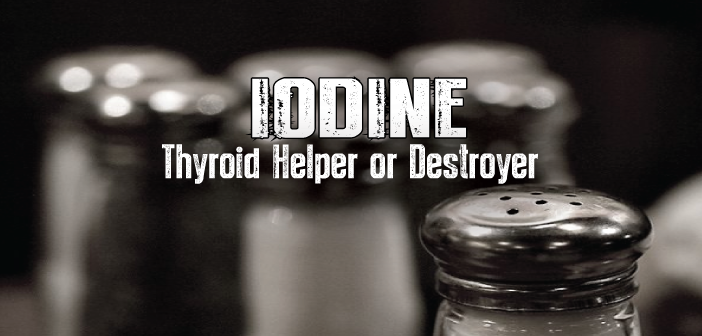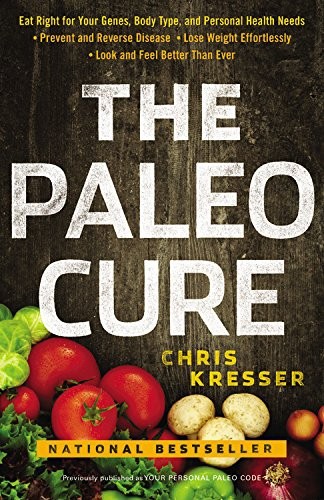
Chris Kresser, Guest
Thyroid Nation
Iodine deficiency
…is the most common cause of hypothyroidism worldwide. Once researchers realized this, health authorities around the world began adding iodine to table salt.
This strategy was effective in correcting iodine deficiency. But it had an unanticipated—and undesired—effect. In countries where it has been added to table salt, the rates of autoimmune thyroid disease have risen. The following is just a sample of studies around the world demonstrating this effect:
Why does this happen? Because increased iodine intake, especially in supplement form, can increase the autoimmune attack on the thyroid. Iodine reduces the activity of an enzyme called thyroid peroxidase (TPO). TPO is required for proper thyroid hormone production.
On the other hand, restricting the intake of iodine can reverse hypothyroidism. In one study, 78% of patients with Hashimoto’s regained normal thyroid function with restriction alone.
However—and this is a big “however”— it appears that iodine may only pose a problem for people with Hashimoto’s and other autoimmune thyroid diseases in the presence of concurrent selenium deficiency. In the study above where rats developed goiter while receiving excess of it, when they were given adequate selenium they did not develop the goiter.
Other studies have shown that selenium protects against the effects of iodine toxicity and prevents the triggering and flaring of autoimmune disease that excess iodine without selenium can cause.
In my practice, I always test for both iodine deficiency and Hashimoto’s when a patient presents with hypothyroid symptoms. If they are iodine deficient, I will start them on a trial of it together with selenium. In most cases, patients see a significant improvement. In a minority of cases, they cannot tolerate supplementing even with adequate selenium intake.
Unfortunately, the blood test for iodine that your doctor might run is not very accurate. The best way to determine iodine status is with a 24-hour urine loading test. This involves taking a large dose of iodine and collecting your urine for 24 hours afterward. If you are deficient, you’ll retain more of the ingested iodine than you should and the level of iodine excreted in the urine will be lower than expected. The two labs I recommend for this test are Doctor’s Data and Hakala Labs.
That said, if your doctor or health care practitioner won’t order these tests, you can simply begin an iodine protocol. This involves starting with a low dose of iodine (I start my patients with kelp tablets that contain 325 mcg of it per tablet) and increasing very slowly over time. As I’ve described in this article, it’s crucial that you also take 200 mcg of selenium per day during this protocol to protect against the potentially adverse effects of supplementation, especially if you have autoimmune thyroid disease.
 Physicians that specialize in treating hypothyroidism with iodine (such as Dr. Abraham and Dr. Brownstein) suggest doses as high as 50 mg per day may be necessary to restore the levels in those that are deficient. I have used doses this high in my practice, but it’s imperative that patients build up to such high doses very slowly, and I don’t recommend doing it without the supervision of a clinician experienced with iodine treatment. Be aware that high doses can lead to a transient increase in TSH levels, which can be mistakenly interpreted as a sign of hypothyroidism.
Physicians that specialize in treating hypothyroidism with iodine (such as Dr. Abraham and Dr. Brownstein) suggest doses as high as 50 mg per day may be necessary to restore the levels in those that are deficient. I have used doses this high in my practice, but it’s imperative that patients build up to such high doses very slowly, and I don’t recommend doing it without the supervision of a clinician experienced with iodine treatment. Be aware that high doses can lead to a transient increase in TSH levels, which can be mistakenly interpreted as a sign of hypothyroidism.
Finally, it’s important to keep in mind that a minority of patients with Hashimoto’s confirmed by biopsy (the gold standard) never test positive for thyroid antibodies. This is probably because their immune systems are so depressed they can no longer produce antibodies. If you have a combination of hyper- and hypothyroid symptoms, I would still suspect Hashimoto’s even if your thyroid antibody tests are normal. It’s wise to be cautious with iodine if you have any signs of autoimmune thyroid disease, even without a confirmed diagnosis.
About the Author
 Chris Kresser graduated from the Acupuncture and Integrative Medicine College in Berkeley on April 2010. Passed the California Acupuncture Licensing Exam in August of 2010, and has a private practice in Berkeley, CA. He is one of the best resources around for simple and clear evaluation of the latest scientific research out there. Chris is a licensed acupuncturist and functional medicine practitioner and specializes in treating metabolic problems, chronic fatigue, thyroid dysfunction, and digestive problems. He also consults with patients throughout the U.S. via telephone and Skype. Follow Chris at his website, ChrisKresser.com, follow him on Facebook and Twitter.
Chris Kresser graduated from the Acupuncture and Integrative Medicine College in Berkeley on April 2010. Passed the California Acupuncture Licensing Exam in August of 2010, and has a private practice in Berkeley, CA. He is one of the best resources around for simple and clear evaluation of the latest scientific research out there. Chris is a licensed acupuncturist and functional medicine practitioner and specializes in treating metabolic problems, chronic fatigue, thyroid dysfunction, and digestive problems. He also consults with patients throughout the U.S. via telephone and Skype. Follow Chris at his website, ChrisKresser.com, follow him on Facebook and Twitter.
PLEASE take a moment to also ‘Like’ us on Facebook and follow us on Twitter and Pinterest. You can also listen to Tiffany and me on Thyroid Nation RADIO.
Questions or anything to add about this trace mineral? We want your thoughts in the comments section–Please!




